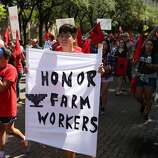By Bob Egelko Updated 9:41 pm CST, Friday, November 13, 2020
Photo: Sara Gobets / Special To The Chronicle Image 1 of 3
Masked workers pull tarps up from raspberry fields in Salinas in front of a mountain scorched by a wildfire. Growers have challenged the United Farm Workers union’s right to organize on their property.
The Supreme Court agreed Friday to hear a challenge by California growers to state regulations allowing union organizers to enter growers’ property during certain nonworking hours to talk to farmworkers.
The state’s Agricultural Labor Relations Board adopted the rules shortly after California’s passage in 1975 of the nation’s first law allowing farmworkers to join unions. They allow union representatives onto farmers’ property for an hour before work, an hour after work and during the lunch hour, for up to 40 days a year.
The state Supreme Court upheld the regulations in 1976, and growers did not challenge them for another 40 years, a period in which the nation’s high court became more conservative and protective of property rights. In a lawsuit by a strawberry grower in Siskiyou County and a grape and citrus fruit farm in Fresno, the Ninth U.S. Circuit Court of Appeals ruled 2-1 in May 2019 that the state was not interfering substantially with the owners’ control of their property by allowing union entry for limited periods.
On Friday, the U.S. Supreme Court granted review of the growers’ appeal, which was supported by state and national farm organizations. The justices will hear arguments early next year and are due to decide by the end of June whether the state is violating the growers’ property rights.
“The Constitution forbids government from requiring you to allow unwanted strangers onto your property. And union activists are no exception,” said attorney Joshua Thompson of the Pacific Legal Foundation, which represents the growers.
Mario Martinez, a lawyer for United Farm Workers, said the union was disappointed by the court’s decision to take up the case. He noted that the National Labor Relations Act, which allows most categories of employees to organize unions, does not apply to farmworkers.
Related Stories
 Court upholds California farmworker union’s right to enter growers’ property
Court upholds California farmworker union’s right to enter growers’ property House lawmakers reach agricultural immigration deal
House lawmakers reach agricultural immigration deal
“A court review of California’s legislation appears to be another attempt to unfairly discriminate against farmworkers, but we look forward to persuading the court that the Ninth Circuit decision should be upheld,” Martinez said.
The high court ruled in 1992 that union organizers could enter employers’ property only in the “rare case” that the union could show “unique obstacles” preventing it from contacting employees in other ways. The 6-3 ruling by Justice Clarence Thomas overturned National Labor Relations Board regulations allowing unions broader access.
In allowing farm labor unions onto growers’ property, the California board said unions faced more difficulties in contacting agricultural workers than they would encounter in most other industries. Many of the workers are migrants, their work schedules change frequently, there are no nearby public areas where they regularly gather, and they can seldom be reached at permanent addresses or telephone numbers, the board said.
In the current case, the federal appeals court said last year that the board’s explanation satisfied the Supreme Court’s 1992 requirement to show “unique obstacles” to ordinary contact. The dissenting judge, Edward Leavy, described landowners’ right to exclude unwanted visitors as “one of the most fundamental sticks in the bundle of property rights.”
William Gould, a Stanford labor law professor and former chairman of both the National Labor Relations Board and California’s Agricultural Labor Relations Board, said Friday that the state board had held hearings across California in 2016 and found that “these workers are cut off from communication from the outside world.” Many are undocumented, most lack cell phones, and some speak neither English nor Spanish, he said.
“All of this will be ignored as the (Supreme Court) will vote 6-3 to push the farmworkers down further,” Gould predicted.
The case is Cedar Point Nursery vs. Hassid, 20-107.Bob Egelko is a San Francisco Chronicle staff writer. Email: begelko@sfchronicle.com Twitter: @BobEgelko

